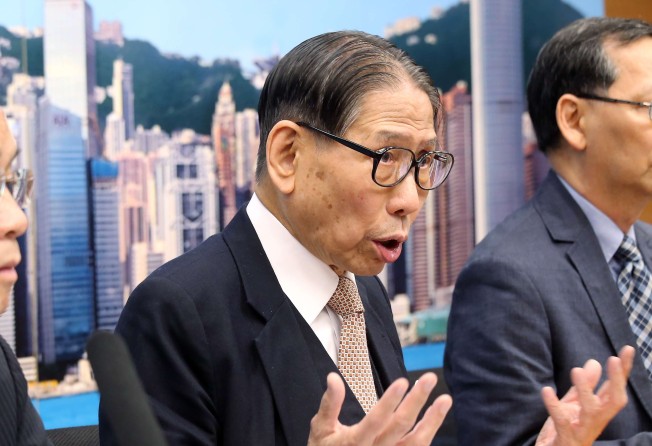Panel head hopes for consensus on standard working hours as committee studies 44-hour plan by unionists
Dr Leong Che-hung says ‘rift’ still exists between representatives from labour and business sectors

The head of the Standard Working Hours Committee is keeping his fingers crossed that consensus can be reached on the contentious issue of regulating working hours, even as the panel’s business representatives are still up in arms against the demands of their labour sector counterparts.
Speaking after a committee meeting on Wednesday, chairman Dr Leong Che-hung said that members had discussed a report submitted by the labour sector last week.
“We studied in detail the report from the labour sector. We discussed their suggestions of how [standard working hours legislation] can be put forward in phases, as well as their suggestions that some jobs can be exempted,” Dr Leong said.
He said there was still a “rift” between those in the labour and business sectors. But he expressed hope that the committee would be able to reach a consensus “in some areas” by the next meeting next month.
Union representatives have been boycotting the committee’s meetings for about a year, accusing the business representatives of a lack of sincerity over standardising working hours.
Last week, the labour representatives, together with current and former labour sector lawmakers, submitted a report they did by themselves to the committee. In the report, they called for a standardised 44-hour week and for workers to be paid 1.5 times their regular wages for every extra hour they worked.
In a surprise move to persuade a reluctant business sector to accept such legislation, they suggested that the initial number of weekly working hours could be set at above 44. The idea was to achieve a 44-hour week eventually, over a period of time they said was open for discussion.
They were also willing to accept exemptions for some jobs, but have yet to identify them, saying the topic warranted further discussion.
“We did not come to a conclusion yet today,” Dr Leong said.
The committee required more time to look into the suggestions by the labour sector.
He said that representatives from the business sector had so far agreed only to accept legislation that required employers to state clearly how many hours the workers needed to work a week, and whether they would be paid overtime rates.
Unionists have branded such a legislation as “useless” because employers could set the weekly work level sky high.
Union representative Chau Siu-chung said he was not confident that the business representatives would eventually agree to the labour sector proposals, accusing them of employing “delaying tactics” since the committee was formed in 2013.
“I hope the business representatives can see that we have shown sincerity in our report. We have put ourselves in their shoes, and that’s why we came up with the proposal that the weekly working hour level could be higher than 44 initially,” Chau said.
“The most important thing at the moment is that the government needs to take a stance on this matter and persuade the business sector to accept such legislation.”
According to official data, the median number of weekly working hours for Hong Kong men was 45.7 in mid-2015. It was 44.3 for women.
Chinese restaurant staff worked the longest – they clocked in at 60 hours, followed by security guards at 57.2.